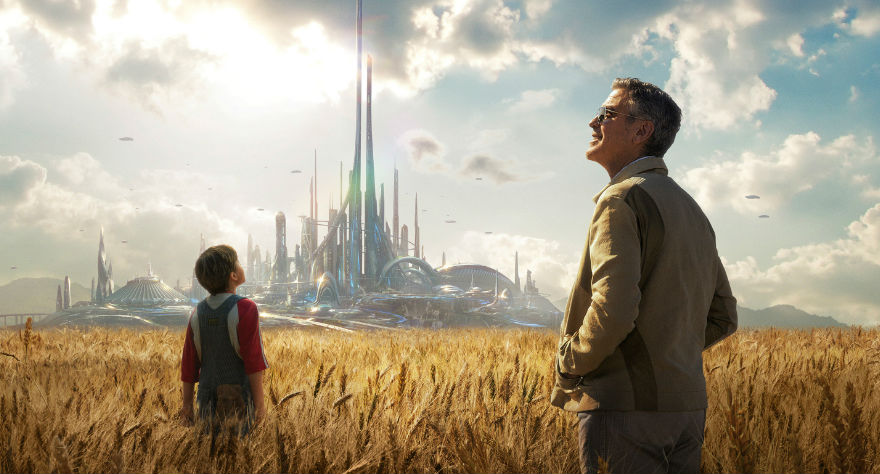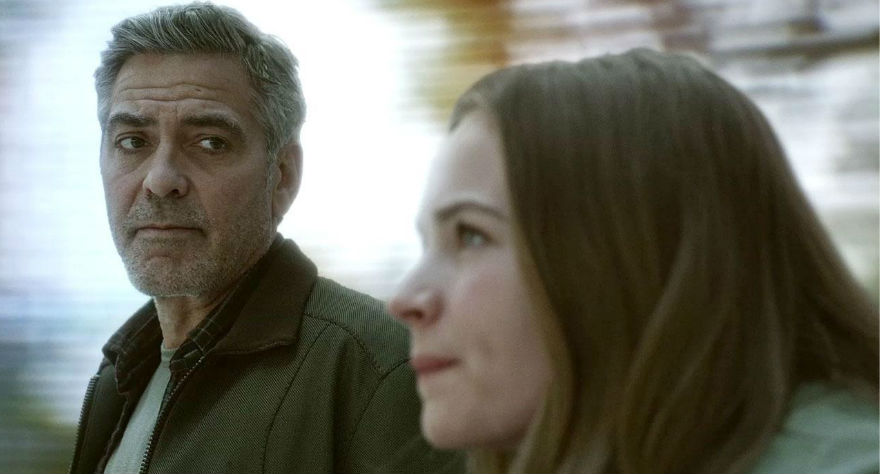
What should be a dazzling sci-fi adventure instead feels like an irritating lecture at a chalkboard.

What should be a dazzling sci-fi adventure instead feels like an irritating lecture at a chalkboard.
On Conan O’Brien‘s final appearance as the host of the Tonight Show (a dream gig he gave up to preserve his integrity), the emotional Late Night legend made one request of his young fans: “Please do not be cynical. I hate cynicism. For the record, it’s my least favorite quality. It doesn’t lead anywhere.” It was concise, it was poignant, and it was from the heart. Brad Bird‘s Tomorrowland has a message similarly meant to galvanize young people to be more optimistic, specifically about the future of our planet. But the road it takes to get there is so long and twisty and convoluted that the message is sapped of all its power. In 130 minutes, Tomorrowland fails to do what Conan did in seven seconds.
Bird’s second foray into the world of live-action filmmaking (after Mission: Impossible – Ghost Protocol) is a certifiable disappointment. It’s a preachy, low-stakes affair that only halfway delivers on its promise of shiny, futuristic spectacle; when the film’s dreary central mystery story becomes its prime focus, fun falls by the wayside in favor of thinly veiled patronization. Tomorrowland is a didactic indictment on the world’s pessimists, complainers and slouches who, according to Bird and co-writer Damon Lindelof, will be the planet’s death-bringers, ushering in the apocalypse. Yeesh.
The filmmakers’ intentions are good, but man is this movie overbearing. Bird and Lindelof seem to get caught up in the idea that Tomorrowland needs to be as culturally and socially relevant and as possible. “This movie needs to be important,” I can hear them saying. “It needs to change the world!” If they had spent more time making the movie more fun and entertaining rather than “important,” a better time would have been had by all and their big ideas would have shone through brighter. They try to dazzle and inspire by showing us a limitless future full of excitement and brave technology, but when their haughty finger-wagging takes over, it feels like we’re sitting in on a lecture at a chalkboard.
The film’s opener is a bumbling dud. George Clooney, playing a crotchety old scientist named Frank Walker, addresses the camera directly, recounting the extraordinary series of events from his boyhood that led him to Tomorrowland, a sort of dreamers’ utopia existing in a parallel universe, built by the brightest minds in history as a place for big thinkers to unleash their true potential. We flash back to the 1964 World’s Fair in Queens, New York (a stunning recreation), where a young Frank hopes to wow the crowds by entering into an inventors’ competition with his homemade jet-pack. He’s denied admittance, though, by a sniveling, arrogant judge (Hugh Laurie) who’s got “big bad” written on his forehead from the moment we see him. A young, freckle-faced girl named Athena (Raffey Cassidy) takes a liking to Frank (he’s gobsmacked, too) and sneaks him an extraordinary pin with a “T” on it that gains him entry to Tomorrowland.
The fleeting glimpses of Tomorrowland we get early in the movie are the best bits. The art direction is wonderful. We see miraculous things like petri dish-shaped swimming pools impossibly suspended in mid-air, with people diving into them and popping out of the bottom, only to land in another pool hovering several feet underneath. There’s a hulking, helpful robot that gives Frank a thumbs-up after fixing his broken jet-pack (a fun nod to Bird’s The Iron Giant), flying vehicles of all shapes and sizes, and sleek-looking towers reaching up to the stars.
Then, sadly, the cool stuff gets cut off as the story’s timeline fractures again, jumping to the present day where we follow a second protagonist, a teenage tech whiz with a rebel attitude named Casey (Britt Robertson). Through little acts of sabotage, she delays the dismantling of a NASA launch pad in her hometown of Cape Canaveral. Her focused devotion to such a futile endeavor makes her a perfect candidate for Plus Ultra, the group that populates Tomorrowland, and so one of the “T” pins mysteriously comes into her possession. We learn that it’s none other than Athena (who hasn’t aged a day, suspiciously) whose mission it is to recruit thinkers like Casey for Plus Ultra. After an explosive tussle with deadly robots disguised as geeky game store owners and a lot of driving, the two find Frank, now an old grouch exiled from Tomorrowland, living in a creaky old house decked out with futuristic gizmos. After another run-in with deadly robots, Casey and Athena convince Frank to take them back to the future. Er, I mean, Tomorrowland. Back to Tomorrowland.

While a lot of the visual tricks and set pieces are inventive and unconventional (a flashy-looking “time bomb” particularly tickled my fancy), the action overall feels kinda, well, weird. Everything moves a little too fast, and the camerawork and staging is so frenzied that we always feel one step behind. Things get disturbing, too, when the robots start shooting people with laser guns that dematerialize them, reducing them to thousands of bits of human remains. It’s off-putting to see these random acts of murder come and go so casually. Even the robots (who look like people) get literally torn to shreds by the booby traps in Frank’s house. One of them gets its face mangled by Casey when she bludgeons it over and over with a baseball bat. It’s like watching a blood-less version of Saw, and it gets really, really uncomfortable.
Frank’s arc plays out like you’d expect, with Casey and Athena re-igniting in the old grump the can-do spirit he lost as a boy. Clooney’s really good at his job (he constantly growls, “Ah, hell!” to sell us on his crankiness, and it works), but there’s nothing performance we can take home with us. Robertson sells the visual effects well with her open-jawed looks of astonishment (Jennifer Lawrence has become a grandmaster at this). But she, like Clooney, doesn’t go above and beyond her call of duty. Cassidy, the youngest cast member, is the only actor in the movie who excels, delivering her lines with as much maturity and poise as Clooney and Laurie. Sometimes you’ll see her standing in the background or on the side of the frame, reacting to Clooney and Robertson’s banter with looks of concern or amusement or sadness: In these small moments, she’s the best thing on the screen. That’s saying a lot.
Tomorrowland is all about bigness. It’s full of big ideas, big-budget visual effects, big-time action, and a great, big chin (his name is George). Why in the world, then, does it feel so goddamn small? It’s an issue of scale; while the movie starts off with sense of grandeur, reveling in the joy of imagination and ingenuity, the story’s scale progressively shrinks, to the point where, by the finale, the fate of two worlds is being fought over by four white people in a claustrophobic, computer generated room. I specify them as being white because I think it’s offensive that a film which claims to have a global message (at the end we see a montage of dreamers of all ethnicities looking to the sky with a glimmer in their eye; where were they in the rest of the film?!) suggests that the world can be a brighter place, but only once the human race’s potential is unlocked by caucasian geniuses.
The doomsday device that drives the film’s narrative is a machine on top of a tower that essentially spreads fear and cynicism across the world, poisoning our fragile minds. It’s a barely disguised skewering of modern media and news outlets, and ironically, it’s comes across like an off-base observation of the new generation’s collective intellect and temperament. Young people these days do have a troublingly romantic fascination with the idea of a dystopian future, but they’re not helplessly susceptible idiots. There’s a difference between cynicism and skepticism, and I don’t believe young people are little emo sacks of inaction Bird and Lindelof seem to suggest they are by making the movie’s messaging so blunt and condescending.
It hurts me that Bird, a storyteller near and dear to my heart, has produced such a clunker of a film. Tomorrowland fits into his filmography only to the extent that it’s about people striving to maximize their potential, a thread that runs throughout all his work. In almost every other respect, it’s uncharacteristically messy, contrived and ideologically confused. Optimism is key, though, and I sincerely hope Bird’s next offering will reflect the greatness he showed in The Incredibles, The Iron Giant and Ratatouille. Onwards and upwards, I suppose.